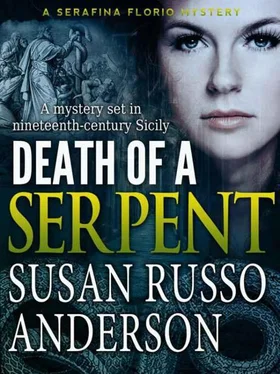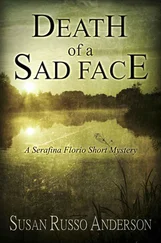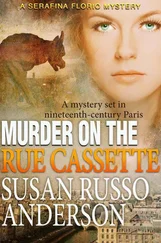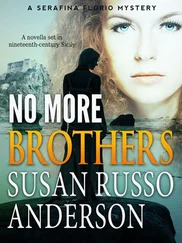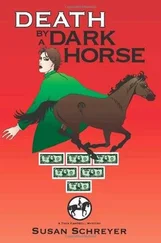Susan Anderson - Death of a Serpent
Здесь есть возможность читать онлайн «Susan Anderson - Death of a Serpent» весь текст электронной книги совершенно бесплатно (целиком полную версию без сокращений). В некоторых случаях можно слушать аудио, скачать через торрент в формате fb2 и присутствует краткое содержание. Год выпуска: 2012, ISBN: 2012, Издательство: Conca d, Жанр: Исторический детектив, на английском языке. Описание произведения, (предисловие) а так же отзывы посетителей доступны на портале библиотеки ЛибКат.
- Название:Death of a Serpent
- Автор:
- Издательство:Conca d
- Жанр:
- Год:2012
- ISBN:9780984972616
- Рейтинг книги:5 / 5. Голосов: 1
-
Избранное:Добавить в избранное
- Отзывы:
-
Ваша оценка:
- 100
- 1
- 2
- 3
- 4
- 5
Death of a Serpent: краткое содержание, описание и аннотация
Предлагаем к чтению аннотацию, описание, краткое содержание или предисловие (зависит от того, что написал сам автор книги «Death of a Serpent»). Если вы не нашли необходимую информацию о книге — напишите в комментариях, мы постараемся отыскать её.
Death of a Serpent — читать онлайн бесплатно полную книгу (весь текст) целиком
Ниже представлен текст книги, разбитый по страницам. Система сохранения места последней прочитанной страницы, позволяет с удобством читать онлайн бесплатно книгу «Death of a Serpent», без необходимости каждый раз заново искать на чём Вы остановились. Поставьте закладку, и сможете в любой момент перейти на страницу, на которой закончили чтение.
Интервал:
Закладка:
Bella’s Letters
Wednesday, October 10, 1866
Serafina chose to read Bella’s letters in her father’s study, hoping they’d contain information of value-not just addresses and facts, but something of the character of the writers and, more importantly, a glimpse of Bella’s life.
In addition to those from Baldassare, there was correspondence from a woman, a noblewoman, judging from the seal and fine grade of parchment. And considering the loopy script and garish color of ink, the letters were written by the black swan Serafina had seen at the wake last night, Bella’s contessa friend. The return address was a number on the Piazzetta del Garraffo, which, if Serafina remembered correctly, was close to Baldassare’s shop.
She arranged the letters by sender, sorted them by date with the oldest on top, and settled in for a good read.
The father’s spanned a decade, a long time in a prostitute’s career. The oldest contained short bursts of news along with commands for his daughter’s return. Nothing of the man in them, only announcements of life and death. In an early letter her father wrote,
Your brothers are dead, all of them. Lost in a despicable battle on the outskirts of Milazzo. One day, one bridge, four brothers, eight-hundred lives. Your mother’s mind, too heavy with grief, is a sinking ship. You must come home.
N. Baldassare
In his middle correspondence, Serafina noticed a shift in the old man’s regard for his daughter. Gradually, he changed from anger and disbelief to resignation. Those were the longest letters, containing news of this cousin, that marriage, a feast, a play they’d attended. He told Bella about their customers, their orders, the relative ease of obtaining cotton ‘now that the war in America is over.’ Serafina began to get a sense of the man, laughed at his humor, smiled at his words of endearment.
In his last letters, it was apparent that father and daughter had been meeting and that the reason for his change toward her was Bella’s decision to leave an occupation he loathed. Serafina read his letters a second and third time, was struck by the frequency of words like ‘love,’ ‘sweet,’ ‘tender,’ phrases such as ‘your joyous face,’ his hope for the future. He signed all of these, ‘Your loving father, Nittù.’
The contessa’s were fewer. They alluded to Bella’s plans with phrases like, ‘I go to Paris next month to visit Worth amp; Bobergh,’ and ‘I trust the monzù will honor his intention to let me visit his great house,’ and ‘My trip proved all that I hoped it would and more. I cannot wait to talk. We have so much to prepare.’ It was clear that the two women were engaged in an economic venture. Bella’s need for capital explained her work at Rosa’s and supported the madam’s contention that the prostitute planned to quit the house.
Serafina wrote a summary of what she’d learned from the pile of letters-character impressions of Baldassare, Bella, and the contessa, plus a corroboration of what she’d already known. No fresh information. No leads. She fingered her brooch, lost to her surroundings.
The Brazen Serpent
“Giulia, sweetness, I need you to look at something,” Serafina said, entering the kitchen.
Her middle daughter, the one born with a needle and thread, took the Godey’s from Serafina and made a face. “Where did you get this?”
“At Rosa’s. Tell me what the words say.”
Giulia hunched over the pictures, scanned the type with her fingers. “It’s about a church in the north, their vestments and cups and such. And,” her finger paused over a phrase, “it talks about a bronze serpent. I didn’t know Rosa embroidered.”
“You’d be surprised what Rosa gets into. And by the way, who’s been using Papa’s English dictionary?”
Giulia’s smile lit her face.
“So industrious, my best designer of high fashion. Just remember to put his books back when you’ve finished with them. I noticed some of his shelves were disordered.”
Giulia nodded.
Serafina kissed her daughter’s forehead.
Bronze serpents? ‘Cups and such’? Serafina wanted more information. She decided to visit the Duomo’s priests.
As she hitched her trap to a post, she saw a group of children on their way to school, some running, others walking backward or skipping. The streets were full of people heading to the straw market or to the more expensive shops facing the piazza. Mules with jingling headgear pulled painted carts. Serafina caught the scent of warm bread and waved to the baker, greeted Arazzudda, a peasant whose thirteenth child she delivered last week.
She plowed up the rectory’s stoop. Misjudging the depth of the last step, she tripped and snagged the hem of her skirt.
While she waited for the priest, Serafina ran a palm over her scuffed boots, wiped her hand on the side of her dress. She was sick of wearing black, certain she could grieve for her husband just as well in a fine watered silk of alizarin crimson or jade.
The door opened.
“I’m investigating three murders. Perhaps you can help.”
When he sat, she smelled tobacco and grappa.
She handed him the Godey’s Lady’s Book , open to a colored plate of the brazen serpent on a cross. “What can you tell me about these drawings?”
He glanced at the pictures, stabbed a dirty fingernail at one. “Of these I know nothing, except that they’re very beautiful, especially this chalice. We could use it here.” He put a finger to his lips. “But we have a visiting priest, a scholar. He might know.” He rang the bell.
Soon a tall man entered, tonsured and wearing a hooded cassock. He had a large set of rosary beads hanging from his belt. Serafina wondered what possessed monks to wear sandals. His feet were yellow and blue.
After introductions and a brief explanation of her murder investigation, she asked, “What can you tell me about the symbols on these pages?”
He examined the plates. “The brazen serpent. Where did you get these?”
“In the room of a seamstress, one of the victims,” she said.
“Beautiful, this magazine. I’d like to study it some more. May I?”
“Sorry, not mine to lend, I’m afraid,” she said, and continued. “Each of the murdered women had a spiral carved into her forehead, not unlike this,” she said, tapping the embroidery detail of a serpent. “The mark was a spiral of some sort, starting from the bridge of the nose winding to the top of the forehead.”
He shrugged. “But the brazen serpent is a symbol of salvation, not of destruction, of eternal life, not death. In some form it appears in most cultures. Michelangelo painted Moses with the brazen serpent on the ceiling of the Sistine Chapel.”
In her mind she was with Giorgio on their honeymoon in Rome, what, some twenty years ago? He was explaining the meaning of one of those writhing depictions on a frescoed ceiling, probably the same chapel mentioned by the monk. Was it the fresco with Moses and his staff? She wished she’d paid more attention, wanted to rest her head on her husband’s shoulder instead of listening to Fra Yellow Feet.
The priest shook his head. “The carvings you saw were something else entirely. The marks of a deranged soul.”
Serafina didn’t think so. She considered telling him about the serpent’s tongue she saw yesterday morning on Bella’s forehead, but rejected the idea.
“I need to know more about the plates in this Godey’s . It belonged to one of the murdered women. Odd that she would have such a magazine in her possession, but there it is. I need to find out why. And the bent corner indicates she read the article, perhaps studied it. But at least she saw it, was curious enough to mark its place.” She showed him the crease in the page. “Before he died, I would have asked my husband about the brazen serpent. He knew everything.” Serafina blinked hard. “But now I must ask others. And since you’re a church scholar, I’ve come to you.”
Читать дальшеИнтервал:
Закладка:
Похожие книги на «Death of a Serpent»
Представляем Вашему вниманию похожие книги на «Death of a Serpent» списком для выбора. Мы отобрали схожую по названию и смыслу литературу в надежде предоставить читателям больше вариантов отыскать новые, интересные, ещё непрочитанные произведения.
Обсуждение, отзывы о книге «Death of a Serpent» и просто собственные мнения читателей. Оставьте ваши комментарии, напишите, что Вы думаете о произведении, его смысле или главных героях. Укажите что конкретно понравилось, а что нет, и почему Вы так считаете.
